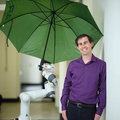News and agenda
25 May 2022
Laurence Willemet wins the Best Thesis Award from the Eurohaptics Society
11 April 2022
Feeling things by touching the screen of your smartphone

Imagine you could feel the brush strokes of Van Gogh, the fur of your beloved pet on a zoom call, fabrics in online shopping or tissues in medical images. Yasemin Vardar, assistant professor at the department of Cognitive Robotics (CoR), wants to enable this breakthrough by developing friction-modulation haptic displays. This week she received Veni funding from NWO for her research idea.
01 April 2022
Javier Alonso-Mora one of the most influential scientists in robotics
21 March 2022
David Abbink, Timo Melman en Niek Beckers in various media
17 March 2022
ERC Grants for Daniel Tam and Javier Alonso-Mora

Javier Alonso-Mora at the Department of Cognitive Robotics (CoR) has been awarded a European Research Council (ERC) Starting Grant, while Daniel Tam at the Department of Process and Energy (P&E) has been awarded an ERC Consolidator Grant.
24 February 2022
TU Delft develops a car that can ‘look into the future’ with smart eco mode

Together with Renault, Delft robot engineers developed the Proactive Eco Mode, a new system that enables drivers to reach the desired speed faster, based on predictions of the future, while maintaining the eco fuel benefits. They have successfully demonstrated the system on French roads.
24 January 2022
Wilbert Tabone in various media
24 January 2022
Dariu Gavrila in various media
23 December 2021
Obstacles no problem for smart robots

Robots that safely navigate busy corridors to deliver medicines to nurses. And drones that manoeuvre around people, rubbish bins and poles without smashing things up. This is possible thanks to the models developed by researcher Javier Alonso-Mora.
13 December 2021